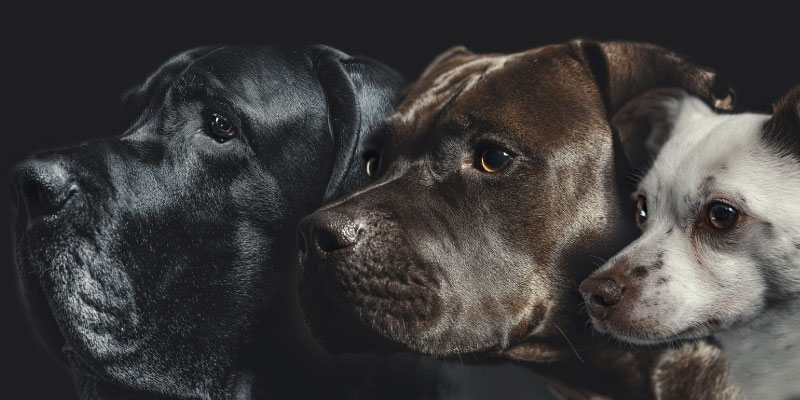Are you thinking about taking the leap? Here’s a small list to get you started.
While it may sound strange to some animal lovers, many of us have never grown up with a pet in our lives. So of course, there’s lot of research to be done before you jump in, and one of the most important one is going to be the breed of the dog.

There are, of course, parallels between looking after pets and looking after our family, but there are just as many difference.
If you’re not too sure about which breed is best for you, we’ve compiled a list of the easiest dogs for all sorts of different owners and lifestyles.
There is no such thing as a ‘perfect’ dog breed
Depending on who you ask, you’ll get different answers on what’s the best dog breed. Usually they will remember their old family dogs or current breed and tell you all the amazing things about their pooch.
But remember that originally, most dog breeds would have been created for a purpose in mind; whether hunting, guarding, herding, pulling sleds or as companions dogs, each different type will have different needs and different pros and cons.
No dog is perfect, they will all need training, some more than others. The smarter the dog, the more training it will need to keep them happy, but the easier it is to train. Dogs that may lack some smarts don’t need as much training and attention in the long run, but they may cause a lot of frustration to begin with as they don’t pick up potty training or basic commands to start with.
However, all dogs are trainable, and all dogs require effort. More importantly, all dogs have their own unique personality, so even if you get dog breed that is usually full of energy, you may get the lazy boy in the pack. Not all golden retrievers are smart, not all bulldogs are dumb.
Each one will have pros and cons, but all dogs will give you love, loyalty and companionship.
The most mellow dog breeds (small to medium)
If getting out of the house is an issue for you, or you’re particularly house proud (aren’t we all?), then small and calm dog breeds may be the best choice for you.
Shih Tzus
Other than being all kinds of cute, the Shih Tzu is small enough to live in an apartment space without any complaints.
This dog will not require walking as often as larger breeds, but be prepared to devote all your attention to it – Shih Tzus can be very clingy and tend to favour one parent, particularly for cuddles. They were breed as companion dogs, and that’s what they want: company.
This makes them ideal for older people who suffer from loneliness, or just those of us who’s main ambition in life is to watch every Netflix series in alphabetical order. Not the best for more active owners.
- Great companion Dogs
- Small size fits any size living space
- Generally a ‘quiet’ breed, not much inclination to bark
- Doesn’t require long walks or lots of exercise
- Long coats require maintenance and grooming
- Require a lot of company and can take time to learn how to be left alone
- Can take longer than most breed to learn how to potty train
Poodles
These are ideal for anybody who suffers from allergies, and they’re not always the fashion accessory you might imagine.
They’re more athletic than Shih Tzus so they will require more stimulation, but this also makes them great for families. Even better, they come in three size, miniature (think handbag dog), toy (think Lady from Lady and the Tramp movie) or Standard (about bum height).
One fantastic advantage of owning poodles is that they’re one of the easiest dogs to train. Poodles are what’s known as ‘thinking dogs’, which makes them obedient and very attentive to their owner.
Once they’ve grown a little older, this might even make them ideal for entering competitions, if you’re so inclined! Just be mindful that they will require more grooming and training than other dogs. But once trained and entertained, this is one of the best pets around.
Short on cash? Find out how to groom your dog at home.
- 3 sizes means there a poodle for any living space
- Obedient and smart dogs that are easy to train
- Friendly disposition makes them great for families of all ages
- Non-shedding hair makes them more likely to be hypoallergenic but not guaranteed.
- Requires frequent grooming (and no you don’t have to shave them in a certain style)
- May not require long walks, but will require training and mental stimulations; ie. games and tricks, to keep them happy.
Shar-Pei
A medium size breed, the Shar-Pei is one of the best dogs for first-time owners because it’s so versatile.
This little pup will never let you down – it’s fiercely loyal and acts very calmly around the home. This loyalty can turn aggressive though, especially against other dogs and they will be mistrustful of strangers. Originally, they were guard dogs, so keep that in mind. On the bright side, you’ll know the moment a thief tries to walk through the door.
So you will need to invest heavily in giving your puppy lots of socialisation and training to begin with – they are stubborn, but smart. On the bright side of that, this calm breed will happily settle for a few short moderate walks and won’t bother you much around the home as you get about your day. They like to play, but they also like to sleep. Alot.
They are just as well suited for urban environments as it is strolls in the countryside, so if you’re moving around, you can guarantee it will never complain.
- Incredibly loyal and protective dogs
- Happy to have a couple of moderate walks a day
- Calm and independent temperament
- Great dog for city living
- Short lifespan of only 6-7 years
- Expensive breed – both to buy and possible health care issues down the line.
- Requires a lot of training in the first year of its life to ensure you can control their ‘guarding’ behaviour. Best to get as a puppy than a rescue so you can properly socialise the breed (unless you have experience with the breed)
Bulldog
These super cute pups are better suited to cuddling up on the couch than barking every time the postman comes to the door!
These are very low maintenance breeds, meaning they can be looked after by older people with no problems, but also families. They don’t require long walks, in fact it’s better if you keep their exercise short and brisk.
As very affectionate dogs, they’re great for kids, and don’t require a lot of space to lounge. So whether you have an apartment or a larger home, these affectionate lumps will happily make their own space next to you.
Be advised, however, that Bulldogs do not take to training as well as other dogs. Let’s just say, if the Border Collie is the class president, the Bulldog is the stubborn guys sitting at the back of the class trying to ignore the teacher.
Equally, they may also encounter health problems with their breathing, as well as hip issue. This is not a dog to get without pet insurance. Be prepared to seal with snoring, and having to clean the folds in their face. On the bright side, their short coat, means you only need to brush them quickly a couple of times a week.
And whilst they may not need a whole load of training, they will need a lot of love! They guys are love hogs, and just want to be close to you.
- Low maintenance dog / low energy dog: Only need a couple of short walks a day
- Short hair dog doesn’t require a lot of brushing
- Good for apartment living
- Happy in their own company (see notes on French Bulldogs below)
- Incredibly affectionate couch potato
- A lot of potential health issues with hips and breathing. Insurance needed.
- Not driven to work – can be harder to train that some
- Snoring. They might not. But most will snore and loudly
- Toy breeds (ie. French Bulldogs) can be prone to separation anxiety, unlike English Bulldogs
What breed of dog is quiet and calm?
Perhaps you live in an apartment building or have particularly sensitive neighbours. Maybe you just want to avoid getting a dog that is going to bark at every stranger as you run, or every letter through the mail box.
For this reason, as a first-time dog owner you’ll want a breed that doesn’t overreact or bark the house down at 4am. The following relaxed dog breeds will help to keep a sense of calm around the house.
Golden Retriever
There’s a reason why this breed is always in the top ten of dogs, and that’s because of their calm, sweet, easy going nature.
They are probably one of the calmer most intelligent breeds, meaning first time dog owners have more than one chances to get it right. Even if they do end up learning a bad behaviour, these gorgeous loveable eternal puppies will love nothing more than to please you and keep trying to do right by you.
What they want more than anything is love. If you have a large family and want to add an extra member to it, Golden Retrievers will adapt well to a big back of rumbustious dogs, toddlers, children or teenagers, and are unlikely to get barky or bitey.
They do, however, need a fair amount of exercise – minimum of 40 to 60 minutes a day of vigorous exercise or off the leash running. So make sure you have a larger garden, park, or forest nearby to keep them fit and healthy. Because if you let them, these big comfort eaters will eat themselves into obesity and laziness.
- Calm, gentle and adaptable nature
- Intelligent and quick learner who are eager to please
- Great family pet who love being surrounded by a big pack
- If kept fit and healthy, they have lots of stamina and will be happy to go on any adventure with you
- Requires 40 to 60 minutes vigorous exercise a day – a walk around the block won’t satisfy this pooch
- They can get to 30+kilos so they are a medium to large size dog better suited for the countryside
- Big comfort eater prone to overweight issues if you’re not careful
Bernese Mountain Dog
Despite the name, the Bernese Mountain Dog is just as content staying at home as it is going outside and braving the elements. However they will need a lot of space for when they get a burst of energy, so definitely better suited for a home with garden or country living, rather than apartment and cities.
These fiercely intelligent pups will respond well to training, and are known for becoming very attached to their owners. Originally, these adaptable dogs where a one size fits all farm dog: guarding, herding, hauling carts, and looking after the family. They are eager to please and love company, so they ideally need someone around most of the time.
For that reason, they will be perfect for an active families, ideally with more room as they are larger than most calmer dog breeds.
They’re very strong and will follow you around if you do want to take them on walking holidays, hiking, running or camping. These pups are calm but perfect adventure dogs.
Downside? These pups were made to work. And work you have to give them. If you don’t have the time to train and keep these puppies occupied, you won’t have a good companion and they may become destructive. They also notoriously shed a lot, so be prepared to brush, brush, brush on most days.
- Great for active couples or families looking for an adventure companion
- Very intelligent breed who are easy to train
- Can carry a good amount of weight if you are thinking of going hiking or camping with your dog (able to pull 1,000 pound carts once fully grown) – we recommend you don’t reach this limit, but can carry a good size dog pack
- Long coat helps protect them in cold weather, with a double layer fur coat for cold winter snow which they shed for the summer
- They shed. A lot. Especially they they get rid of their winter coat
- They are a family dog and love company and space. Not great for apartments or if you need to leave for work for the whole day
- Smart dogs require a lot of mental stimulation, so be prepared to teach them tricks and get to to work
Cavalier King Charles Spaniel
These majestic little pups are the perfect lapdog for less active people. They’re a smaller breed, so they won’t overwhelm their owners, and will be content in smaller spaces.
They are very sweet in their nature and much like the shitzu, are generally a quiet breed that are not prone to bark. If they do, it’s to alert their owners to somebody at the door, but they will soon return to their warm spot on the couch!
Be mindful that a Cavalier King Charles Spaniel may cost you more in vet fees as they are prone to hereditary conditions like visual problems and hip dysplasia.
The Cavalier King Charles Spaniel was breed to be a lap dog to the Royals, so you get a wonderful companion who loves everyone in the family and are eager to please: meaning easy to train and great with children.
The downside to this is that if you need to leave the home for longer than 4 hours a day, or if you can’t afford to get a good dog walker to come in and keep them company to break up their day, don’t get this breed. They are prone to separation anxiety so you’ll need to be prepared to do what you need to do in order to help them.
- They don’t require a lot of exercise: maybe an hour a day, or two half hours split over the day.
- Eager to please and easy to train
- Wonderful companion dogs who will be your loveable shadow around the home
- Generally a quiet smaller breed who are not prone to excessive barking
- Prone to separation anxiety if you leave them alone for long periods – you need to train them slowly or be prepared to pay out for dog-sitters or dog walkers
- Expensive breed: they are not cheap to buy and can be prone to healthy issues later on in their life
- Long hair coats needs regular grooming
Easy care dog breeds
If you’ve got a busy lifestyle, the last thing you need is a dog that’s shedding hair everywhere or needs frequent trips to the salon. Invest in one of these large or small dog breeds instead.
American Pit Bull Terrier
What’s the American Pit Bull Terrier doing in a best first owners list? Well, thanks to their short, tight coats, the American Pit Bull Terriers hardly ever need brushing. They won’t even complain if you put them in the bath!
These pups have a bad reputation. Yes, they have high guarding instincts and there’s a reason why people who want to feel safe in their home get this breed. Yes, if you have small children and babies don’t get this breed. Yes, if you rescue one of these guys, you may need to do a whole load of training.
But you know what? There’s more Pit Bulls in shelters around the world, because so many people just don’t know how to take the time to look after these loyal and beautiful Dogs, and because of their bad rep.
So we are giving a little shoutout for a misunderstood breed that, with a whole load of love, time and training, can be one of the best companion for any adults looking for a goofy mountain of love.
However, be wary that these pups like to spend a lot of time outside, so they’re better for more mobile owners.
- Easy to find a puppy or dog who needs to find a good home at a shelter
- Incredibly loyal, loving, goofy and affectionate breed
- Lot of stamina and energy, great from running and cycling enthusiasts
- Smart breed that if trained early, are eager to please
- Don’t rescue a pitbull if you have young children – you don’t know how they’ve been socialised
- Requires a lot of time and attention to train well
- High prey drive: don’t leave your Pitbull with small animals or other small pets
- Stubborn breed: one they learn a behaviour, it can be tough to get them to unlearn it
Greyhounds
Here’s another breed you may find a lot in kennels, pounds and shelters around the world and who should get your attention. Usually, these dogs have a bad rep for being super active, super independent, and super fast.
But considering that most of these racing dogs need to find a home once they turn around 3 or 4 and their racing career is over, it’s also good to bear in mind that these graceful dignified long legged giants are super friendly, even a little timid, and love nothing more than a soft sofa or blanket.
In short, they are calm, quiet, gentle giants who are adaptable to city and country living. Sure, they run fast, making them excellent companions for anyone who is training for a marathon. But they’ll be just as happy chasing a ball for 30 minutes down the park every day, as long as they also have access to a garden.
If you are willing to let them have their short burst of energy, you’ll find a wonderful family companion who enjoys their own space, won’t stumble into smaller children, and are very low maintenance.
Beware though, these guys were bred to chase small furry creatures. Keep the garden enclosed, and the squirrels or cats far away from your natural hunter of a dog.
- A timid, quiet gentle giant just looking for love
- The stamina to keep up with most of your activities
- Doesn’t require as much exercise as you might think
- Low maintenance dog in terms of grooming or daily play
- Many charities and organisation looking for loving homes who are willing to give these dogs for free
- Independent dog – more likely to chill in their own bed than cuddle under your blanket
- Large dog breed that can reach average height of 71cm
- Short skin and low body fat means you’ll need to buy coats and jumpers for winter walks
- Big hunting prey instinct: if you have a cat at home, or are squeamish about them catching the occasional squirrel, probably best to avoid
Boxer
These larger dogs may need more space and activity, but they make up for it in low maintenance! They have very short, thin coats which only requires a quick brush every week. You don’t even really need to bathe them, unless you do have a particularly muddy adventure outside.
They make fantastic family pets for anyone who has active children or lifestyle that is always on the move. They need at least 2 hours of regular exercise a day, so if you’re thinking of heading to the hills for a hike or getting the kids and dog in the garden often, these goofy beauties will love nothing more than join you.
Though Boxers may be wary of strangers, proper socialisations will mean they’ll quickly adapt to any situation thanks to their boundless energy and smarts. However, a bored Boxer may use those smarts and energy in many destructive ways, from opening the door to destroy toilet paper, to finding inventive ways to redecorate the carpets.
Equally, due to their faces and folds, they are messy eaters and (notoriously) suffer from bad flatulence. But you’ll have an active puppy well into old age, as this breed will act like he’s 2 years old till he’s past 10 years old.
Find out the best ways to socialise your dog.
- High energy dogs, great for hiking, walking or jogging
- Lots of love and affection for everyone in their family
- Smart dogs that is easy to train and maintain
- Brachycephalic and can easily overheat in the summer
- Prone to destructive behaviour if not given a contrastive outlet for their energy
- Can drool a lot, be a messy eater and tendency to fart
Smooth Dachshund
Unlike their wire-hair counterparts, the Dachshund only needs a brush once a week. The former may need a trip to the groomer twice a year, which can be expensive! As smaller dogs, these are ideal for families with young children, but may perhaps be a little active for older owners.
They are extremely loyal and come in two sizes, meaning they are perfect for apartment living or home living. They love nothing more than to cuddle under a duvet on a rainy day, but love nothing more than getting outside and finding playmates.
The Dachshund is known for loving other dogs, and will love every any addition to your family: from a new baby, to a second pooch.
However, be prepared to dealing with the barking. This is both good and bad. No thief will walk through your door unheard, and neither will any parcel, posts, or neighbour. So there’s that. Equally, they have a big burrowing instinct, which is lovely when they burrow into your arms, but may get a little annoying if you start finding suspicious holes in your garden.
- Small compact size makes them easy to carry, whether miniature or standard
- Very low maintenance dog: as happy chilling in a sunny spot as going outside running with you
- Very sociable dog that will be friendly to most dogs and people they meet
- Does not require a lot of exercise
- Can have a tendency to bark if not properly trained
- Burrowing instincts may mean holes in the garden
- Stubborn breed that is can be more difficult to train than the others
- Greedy eater prone to overweight, which leads to back problems due to their shape. So don’t over feed them
(Mutts) Cockapoos, Cavapoos, Maltipoos and Goldendoodles
There’s a rising trend for mixing breed dogs with poodles. And why shouldn’t they be?
Mixed dog breeds are brilliant: they tend to be healthier than pure breeds, live longer and have an element of chance to their nature. With the poodle mixes they get that lovely curly coat that sheds very little.
But all these reasons is also why we couldn’t add a whole section here about “get yourself a mutt and enjoy a lifelong companion!”.
We haven’t put any of these mixed breeds in our lists of best dog breeds for beginner owners is because they are all mutts. They are not established breeds, so character traits, temperaments and even how much they shed will change from puppy to puppy. Maybe once the breed is standardised this may change.
Take the cockapoo for example. This is a mix between a cocker spaniel and a poodle. But was the poodle a toy, medium or standard poodle? This will affect their size, and their temperament. Equally, was the cocker spaniel and American cocker, a show cocker or a working cocker? Three similar breeds but with enough differences to make it impossible to generalise.
Equally, don’t think that just because you are getting a ‘poo’ means that these will always be hypoallergenic. That’s not true. Because these are mixed breed dogs they may get more of the poodle, or more of the cocker, meaning their coats will change dog to dog. It also depends if they are first, second or third generation.
In short, if you want to find one of these adorable dog breeds who are, on the most part, fantastic family dogs, the best advice we can give you is to find a reputable breeder with lots of experience. They will be able to give you the exact history of the dogs, what to expect and whether they are right for you.
There’s absolutely nothing wrong with getting a mix or a mutt. Part of the fun of dog ownership is knowing that your fur baby will be even more unique than anyone else’s.
Pounding the pavement? Try these super active dogs
If you’re feeling like a particularly brave first-time dog owner, you can invest in a larger breed that will exercise with you. Be warned, much like the Burmese Mountain dog, these breeds need training and an active lifestyle.
Consider one of the following:
- Labrador Retrievers: these super loyal playful pups love to run and swim, so they’re ideal for taking outside. They’re also perfect for young families as they’re so affectionate and easy to train. Just be mindful that you need to keep them stimulated to avoid destructive traits.
- Border Collie: just like Labrador Retrievers, these obedient dogs will run around with you. They were bred for herding sheep so they will obey commands. Just be wary that they have two coats so they’ll need more maintenance, and they need lots of exercise to stay healthy.
Whether you’re looking for a pup to keep an elderly person happy, or a family dog that will follow you around, there’s a pooch for every owner. They all have one thing in common – they need love and a good home.




